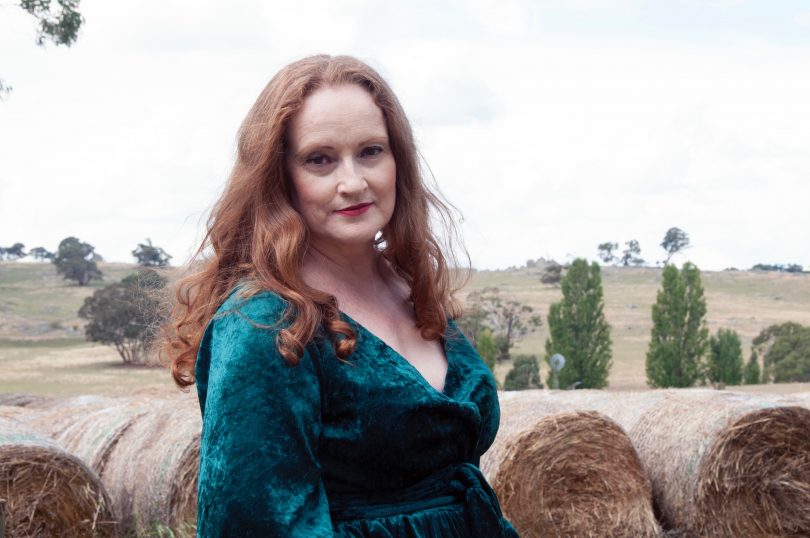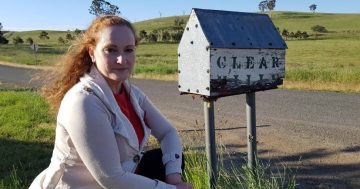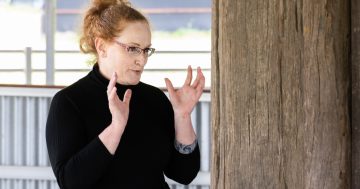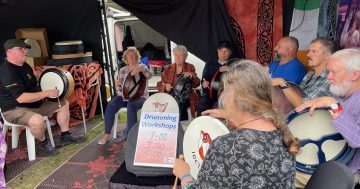
Millicent Armstrong with horses at her Gunning property, Photo: Lucy Knight.
The story of Millicent Armstrong may not be widely known, but as one of Australia’s great female heroes – it should be.
From her early years she was destined to amazing things – one of the first women in Australia to attend university, she then travelled across the world to join the war effort as a nurse and finally returned home as an award-winning playwright.
She was a woman ahead of her time and now Dianna Nixon has gone back in time to tell her story.
Their connection – Gunning in southern NSW, which is where Ms Nixon lives today and where Miss Armstrong wrote and farmed on a soldier settlement block, ‘Clear Hills’, in 1921.
The pair crossed paths (metaphorically) while Ms Nixon was researching the regional town she intended to move to.
“I was amazed to find there had been a playwright living on a property near Gunning in the first half of the 20th century,” Ms Nixon said.
“But I discovered that no one in town had heard of her apart from her relatives and the man who lives at Clear Hills now.”
Miss Armstrong was born in Sydney in 1888 and followed her sisters Ina and Helen to the University of Sydney where she graduated in English.
She debuted her writing in a story for Theatre magazine under the pen name ‘Emily Brown’ and left Australia for London in 1914 to find a publisher.
However, she was quickly pulled into the war effort and ended up at a hospital in France. It was there that she directed plays in a bid to forget the terror and homesickness. Staff and some of the casualties became actors using makeshift props and costumes.
In the face of the German advance in 1918, the hospital was evacuated and Miss Armstrong was awarded the Croix de Guerre for her bravery in rescuing wounded soldiers while under fire.

Actor Dianna Nixon has been researching Armstrong since 2016 and will perform her plays at the Gunning Arts Festival. Photo: Barbie Robinson.
Returning to Australia after the war, she briefly owned and operated the Amber Tea Rooms in Goulburn before travelling further south to Gunning.
She wrote several plays based on her experiences of living through drought, bushfires and debt in the bush. Her play Fire came third-place in the Sydney Daily Telegraph competition of 1923 and Drought was awarded the 1923 Rupert Brooke prize and performed in London.
It’s an incredible story and one Ms Nixon believes was forgotten because Miss Armstrong never married or had children to pass it on. Some of her plays have also been lost over the years and her novel was never published.
Now it’s been five years since Ms Nixon began her labour of love learning about Miss Armstrong’s work, meeting with her relatives, visiting Clear Hills and helping bring together those who want to digitise her plays.
All this has led to a special event at this year’s Gunning Arts Festival on Saturday, 24 April, when actors including Ms Nixon, Chris Carroll, Heather Keens and Holly Ross will perform Miss Armstrong’s one-act plays.
Learning of Miss Armstrong’s story during the COVID-19 lockdown reminded Ms Nixon of the tremendous distances soldiers, nurses, war correspondents and others travelled to war and now the distance created by the pandemic that separates family and friends in separate countries.
“It also reminds me of the long journey artists take in developing their ideas and craft, and finding an audience,” she said.
“Through this project, we want to find an audience for Millicent’s work.”
It’s a fitting role for the writer, performer and director to bring Miss Armstrong’s work to life, near to her home, for the first time in decades.
“This is something I really feel I have to do. Artists have always championed other artists, and I think it’s part of our job to share work that’s languishing but worth knowing about,” Ms Nixon said.
And what better timing, after one of the hardest years for the art and entertainment industry.
The performance is an opportunity for these actors to emerge after months of lockdown.
“One of the artists involved in the readings had to live off their savings because they didn’t qualify – like a lot of us – for JobKeeper – and all the normal work wasn’t there,” Ms Nixon said.
“I hope what people see when they come is a really rich array of voices in the four actors, but also all the characters Millicent imagined.”
Rehearsed readings of Dusk, Thomas, Penny Dreadful and Drought by Millicent Armstrong (1888-1973) will be performed on the corner of Chapel and Gunning Streets in Dalton, from 2:00 – 4:00 pm, and The Picture House Gallery in Gunning, from 6:00 pm – 8:00 pm, on Saturday, 24 April.
Tickets are for the live performances and $20 to view online.













